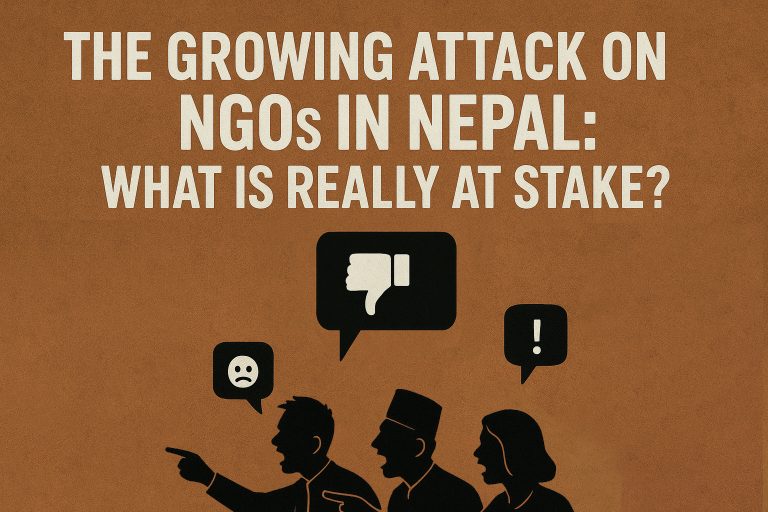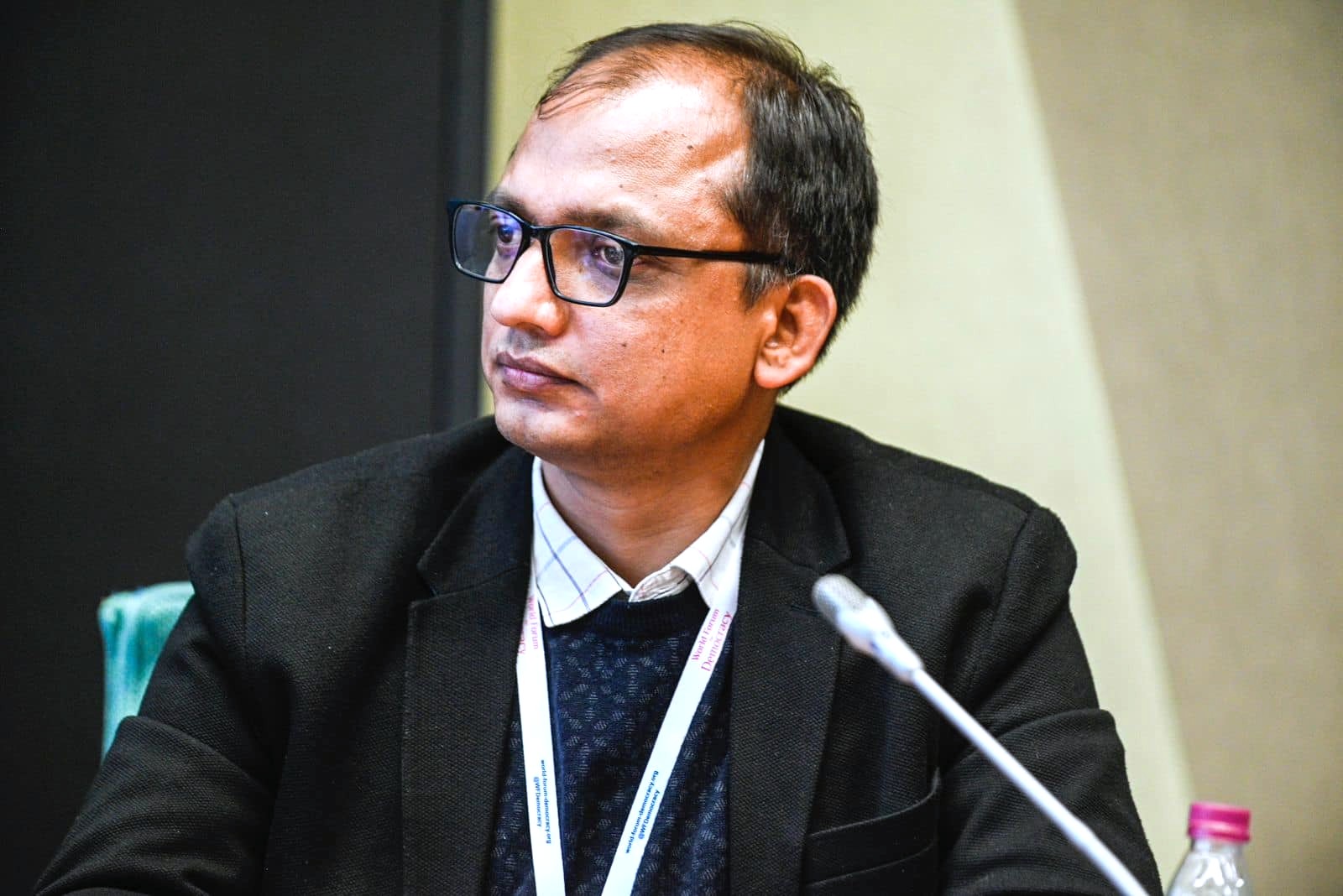The Growing Attack on NGOs in Nepal: What is Really at Stake?
Author:
Prakash Bhattarai
If we spend any time scrolling through Nepali social media these days, we will notice something troubling. There is a rising tide of campaigns vilifying NGOs, often run by anonymous accounts or people pushing extreme ideologies. Some of these critics come from political circles, both old guard and new players, who seem threatened by organizations that have long worked to strengthen democracy and empower marginalized communities. This growing hostility is not just online noise. It reflects a deeper anxiety among certain power holders about losing their grip on resources and authority, which they have been enjoying and exploiting for a long time. So what is really driving this backlash?
A History Worth Remembering
Let’s be clear about what NGOs have actually accomplished in Nepal. Their contributions to Nepal’s democratic journey are undeniable. They were instrumental in the People’s Movements of 1990 and 2006, taking a leading role in the nonviolent uprising that challenged the King’s authoritarian takeover. They helped establish crucial institutions like the National Human Rights Commission and the National Women Commission. Through persistent advocacy, they secured women’s property rights, abortion rights, and the end of bonded labor. They fought for quotas ensuring marginalized communities had representation in all state organs, including federal and provicial parliaments, local governments, bureaucracies, and constitutional commissions. Their roles remained instrumental to write a pro-people Constitution of Nepal in 2015, ensuring several fundamental rights and many progressive provisions, which Nepalese society could hardly imagine.
At the local level, their impact has been equally significant. Community-based groups have empowered villagers to manage forests, irrigation systems, schools, and health services. They have given voice to people who were previously unheard—Dalits, women, indigenous communities, Madheshis, and sexual minorities. These are not small achievements. They represent fundamental shifts in how power and rights are distributed in Nepal.
The New Narrative of Threat
Yet today, we are seeing a coordinated effort to paint these same organizations as enemies of the nation. The accusations are varied but follow familiar patterns. Critics claim NGOs and INGOs are interfering in state affairs, creating chaos by empowering “troublesome” groups to demand their rights. After 1990, it was women and Dalits who were supposedly being radicalized. Post-2006, the finger pointed at indigenous and ethnic groups, Madheshis, and sexual minorities. Now, the fear seems to be that even broader segments of society are claiming fundamental rights, including something as basic as citizenship.
The irony is hard to miss. When marginalized people organize to claim what is rightfully theirs under the constitution, it is labeled as creating disorder. When they demand accountability from those in power, it is framed as “foreign interference.”
What’s Really Behind the Backlash?
The motivations driving this campaign become clearer when you look at who benefits from weakening civil society.
First, there are those who want to monopolize control over resources, both domestic revenue and external funding. With NGOs and INGOs out of the way, there would be fewer checks on how money is spent and fewer voices questioning corrupt practices.
Second, conservative and regressive forces see civil society organizations as obstacles to spreading their narrow ideologies. NGOs and INGOs have consistently championed progressive values, gender equality, caste justice, democratic participation and inclusive representation. For those who want to roll back these gains, silencing these organizations is essential.
Third, political actors across the spectrum fear accountability. Civil society has historically been the watchdog that exposes corruption, demands transparency, and mobilizes communities to hold leaders responsible. A weakened civil society means a less critical public, one that is easier to control and manipulate.
Interestingly, many critics are not actually opposed to NGOs as a concept. What they want is to replace independent organizations with government-sponsored entities run by loyalists, groups that will rubber-stamp policies rather than challenge them.
The Real Problems We Should Address
This does not mean civil society organizations are perfect. There are legitimate concerns that deserve attention. Many NGOs remain heavily dependent on donor funding and struggle when projects end. Some have become too aligned with political parties, compromising their independence. There are valid critiques about superficial advocacy that produces slogans instead of sustained policy change. The disconnect between urban elite-led organizations and grassroots realities is real.
But here is the crucial difference: these are problems that call for reform and strengthening of civil society, not its elimination. We should be having honest conversations about how NGOs can be more sustainable, more independent, and more effective. Instead, we’re seeing attempts to delegitimize the entire sector.
Recent moves like prohibiting NGOs and INGOs from activities deemed to “incite hatred against Nepal” sound reasonable on the surface but can easily be weaponized against organizations doing legitimate human rights, social justice work. When questioning government policies or advocating for marginalized groups can be labeled as anti-national, we are heading down a dangerous path.

What’s at Stake?
If we allow this narrative to take hold unchallenged, we risk losing more than just a few organizations. We risk dismantling the infrastructure that has helped Nepal transition from autocracy to democracy, from exclusion to inclusion. We risk silencing the voices of millions who have only recently gained the confidence to claim their rights.
The fight against corruption, inequality, and injustice requires independent voices willing to speak truth to power. It requires organizations that can mobilize communities, document abuses, and advocate for change. When those voices are systematically discredited and silenced, what remains is unchecked authority.
Nepal’s democratic gains have been hard-won through decades of struggle by the oridinary citizens. Civil society organizations have been essential partners in that journey. Rather than tearing them down based on misinformation and political convenience, we should be asking how to make them stronger, more accountable, and more effective in serving the people they are meant to support. The question is not whether NGOs and INGOs are perfect. The question is whether we want a society where independent organizations can challenge power, advocate for the marginalized, and hold leaders accountable, or whether we are comfortable sliding back toward a system where questioning authority is seen as betrayal. The answer to that question will shape Nepal’s democratic future for generations to come.

Prakash Bhattarai, Phd
Prakash Bhattarai, PhD currently serves as the Director of Centre for Social Change. He has almost 20 years of professional/ academic experience on issues surrounding governance, peace-building, development, migration, and more.
